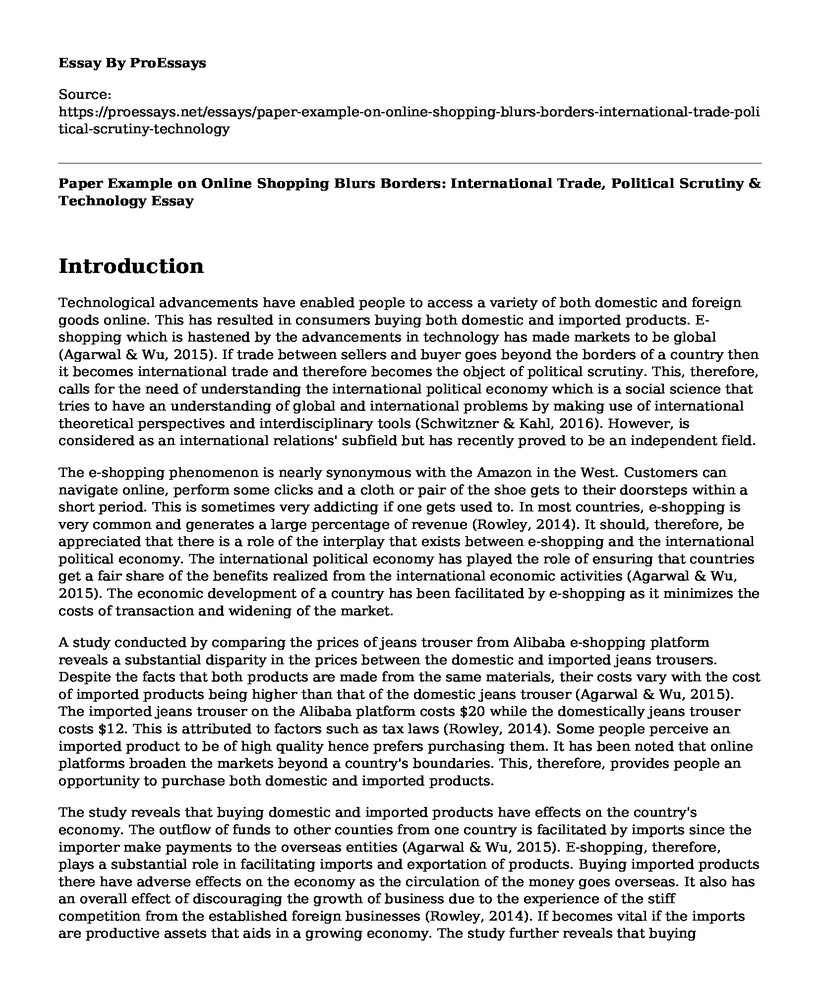Introduction
Technological advancements have enabled people to access a variety of both domestic and foreign goods online. This has resulted in consumers buying both domestic and imported products. E-shopping which is hastened by the advancements in technology has made markets to be global (Agarwal & Wu, 2015). If trade between sellers and buyer goes beyond the borders of a country then it becomes international trade and therefore becomes the object of political scrutiny. This, therefore, calls for the need of understanding the international political economy which is a social science that tries to have an understanding of global and international problems by making use of international theoretical perspectives and interdisciplinary tools (Schwitzner & Kahl, 2016). However, is considered as an international relations' subfield but has recently proved to be an independent field.
The e-shopping phenomenon is nearly synonymous with the Amazon in the West. Customers can navigate online, perform some clicks and a cloth or pair of the shoe gets to their doorsteps within a short period. This is sometimes very addicting if one gets used to. In most countries, e-shopping is very common and generates a large percentage of revenue (Rowley, 2014). It should, therefore, be appreciated that there is a role of the interplay that exists between e-shopping and the international political economy. The international political economy has played the role of ensuring that countries get a fair share of the benefits realized from the international economic activities (Agarwal & Wu, 2015). The economic development of a country has been facilitated by e-shopping as it minimizes the costs of transaction and widening of the market.
A study conducted by comparing the prices of jeans trouser from Alibaba e-shopping platform reveals a substantial disparity in the prices between the domestic and imported jeans trousers. Despite the facts that both products are made from the same materials, their costs vary with the cost of imported products being higher than that of the domestic jeans trouser (Agarwal & Wu, 2015). The imported jeans trouser on the Alibaba platform costs $20 while the domestically jeans trouser costs $12. This is attributed to factors such as tax laws (Rowley, 2014). Some people perceive an imported product to be of high quality hence prefers purchasing them. It has been noted that online platforms broaden the markets beyond a country's boundaries. This, therefore, provides people an opportunity to purchase both domestic and imported products.
The study reveals that buying domestic and imported products have effects on the country's economy. The outflow of funds to other counties from one country is facilitated by imports since the importer make payments to the overseas entities (Agarwal & Wu, 2015). E-shopping, therefore, plays a substantial role in facilitating imports and exportation of products. Buying imported products there have adverse effects on the economy as the circulation of the money goes overseas. It also has an overall effect of discouraging the growth of business due to the experience of the stiff competition from the established foreign businesses (Rowley, 2014). If becomes vital if the imports are productive assets that aids in a growing economy. The study further reveals that buying domestic products have an effect of improving a country's economy as the money remains circulating within the domestic economy.
E-shopping has resulted in an international trade hence facilitating importation and exportation of products. While it comes with its merits, its demerits cannot be underestimated (Rowley, 2014). This, therefore, calls for the understanding of the role played by the International Political Economy in the field of e-shopping. The political economy helps come up with policies and guidelines that help in shaping how international trade is conducted and therefore acts in the interest of any given country's economy.
References
Agarwal, J., & Wu, T. (2015). Factors Influencing Growth Potential of E-Commerce in Emerging Economies: An Institution-Based N-OLI Framework and Research Propositions. Thunderbird International Business Review, 57(3), 197-215. doi: 10.1002/tie.21694
Rowley, J. (2014). Product search in eshopping: a review and research propositions. Journal Of Consumer Marketing, 17(1), 20-35. doi: 10.1108/07363760010309528
Schwitzner, T., & Kahl, C. (2016). International political economy reference sources: an annotated bibliography. Collection Building, 31(2), 49-59. doi: 10.1108/01604951211229845
Cite this page
Paper Example on Online Shopping Blurs Borders: International Trade, Political Scrutiny & Technology. (2023, Feb 06). Retrieved from https://proessays.net/essays/paper-example-on-online-shopping-blurs-borders-international-trade-political-scrutiny-technology
If you are the original author of this essay and no longer wish to have it published on the ProEssays website, please click below to request its removal:
- Essay on McDonald's Branding and Packaging
- Developing Effective Consulting Skills on Example of Southwest Airlines Co
- AirAsia Assets Case Study Paper Example
- Essay Sample on Supplying Fast Fashion: Evaluating the Design Stage of the Supply Chain
- Paper Example on Buyer-Seller Contract Dispute: Who Will Prevail?
- Non-Profits' Impact on US Military Veterans: Service Delivery - Research Paper
- Organizational Change: Strategies to Overcome Challenges - Essay Sample







